Stay in the know on all smart updates of your favorite topics.
Moving from a linear to a circular economy means minimising the waste and pollution by reducing, recycling and reusing. The City of Amsterdam aims to redesign twenty product- or material chains. The implementation of material reuse strategies has the potential to create a value of €85 million per year within the construction sector and €150 million per year with more efficient organic residual streams. Amsterdam set up an innovation program on the circular economy; www.amsterdamsmartcity.com/circularamsterdam. By converting waste into electricity, urban heating and construction materials, the Amsterdam Electricity Company generates 900 kWh per 1000 kg of waste. 75% of the sewage system is separated for waste and rain water and the silt which remains after treating waste water is converted into natural gas. Share your innovative concepts and ideas on circular economy here.
Amsterdam and Haarlem launch groundbreaking sustainable artificial turf pitch innovations
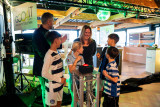
The pioneering innovations were presented of the Scale Up Future-proof artificial turf pitches project, a collaboration between Amsterdam and Haarlem focused on sustainable artificial turf pitches. Over the next few years, more than 250 sports pitches in both cities will be transformed into circular, energy-generating and climate-adaptive sports venues. These artificial turf pitches can not only generate and store energy, but also involve smart water management. An approach that is globally relevant for urban sports infrastructure.
Three consortia collaborate on the sport pitch of the future
The three selected consortia Antea Sport, EnergieVeld and GOO4iT together comprise more than 15 market players. They join forces within this innovation partnership, where there is room for long-term collaboration, co-creation and scalable innovation. The pioneering solutions will make it possible to cool down sport pitches on warm days, help dispose of and collect rainwater, make the pitches more pleasant for the users and possibly even generate energy for the surrounding area. Find out how these innovations are shaping the sport pitch of the future here.
Two municipalities: joint procurement
The Scale Up Future-proof artificial turf pitches project is a unique collaboration between two municipalities and market players. The municipalities jointly procure pooling their purchasing power and use an innovation partnership to challenge the market to test and scale up innovative and sustainable solutions. In doing so, the solutions are also scalable and transferable to other cities in the Netherlands and Europe.
From prototype to pilot fields
The first prototype fields will be constructed in Amsterdam and Haarlem in 2026, in different capacities and combining multiple innovations, where they will be extensively tested and monitored for a year. Successful concepts are then scaled up to full-scale pilot pitches and tested and monitored for another year. This will form the basis for the new standard of sustainable sports pitches, with potential for adoption in other cities around the world. At the same time, existing pitches are already being improved with the most sustainable solutions available, making an immediate impact from the start. The project thus shows how cooperation between municipalities and market players can lead to innovative, climate-proof sports infrastructure with international relevance.
Join us
This project provides cities worldwide a blueprint for sustainable, smart, and future-proof artificial turf pitches. Interested municipalities and industry partners can get in touch and subscribe to our news updates by sending an e-mail to: sportveldvandetoekomst@amsterdam.nl.
Demoday #28: Designing for Circularity in the Port of Amsterdam
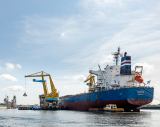
During Demoday #28, we focused on one of the key challenges in the circular transition: how can we make the Port of Amsterdam fully circular?
The Amsterdam port is one of the largest in Europe. It functions as a major energy hub, where fossil fuels still play a central role, and as an industrial hub, where massive flows of raw materials pass through. The City of Amsterdam has set the ambitious goal of becoming fully circular by 2050. This means the port must transform as well. This is a complex and far-reaching task that requires collaboration and innovation.
In this work session, we zoomed in on circular design: how can we make products and processes circular from start to finish?
A closer look at the port
James Hallworth, Commercial Manager at Port of Amsterdam, opened the session by taking the group on a tour through the world of the port. Located in the western harbour area, the port has two main responsibilities. First, it ensures the smooth and safe handling of all maritime traffic on behalf of the City of Amsterdam. Second, it manages and develops the land and industrial areas around the harbour.
To tackle circularity, Port of Amsterdam applies industrial ecosystem thinking. In nature, waste does not exist, and the same principle should apply here. The port aims to build collaborative networks between companies, where waste flows from one company becomes raw materials for another. There is already significant activity around recycling and recovery, but more can be done in higher-value strategies on the R-ladder, such as repurposing, remanufacturing, and refurbishment. Circular by design is a key concept in this shift.
The port is transitioning from measuring success in tons to measuring added value. This shift also means thinking differently about space: circular systems require space to receive, process, and recover valuable materials from waste streams.
Getting hands-on with circular design
Creating a fully circular production process is easier said than done. That’s why we worked through two real-world cases: construction materials and e-bikes. Participants split into groups and explored what a truly circular production process might look like. We also explored the potential role the port could play as an enabler of circular supply chains.
Some key takeaways from the session:
• Material passports: A digital document containing material properties and origin can greatly simplify recycling and reuse.
• Monomaterials: Products made from a single type of material are much easier to separate and recycle at the end of life.
• Smart synergies: Mapping which companies can use each other’s waste flows as input can unlock huge circular potential.
• Financial incentives: Right now, circular processes are often more expensive than linear ones. Smart financial mechanisms could help bridge that gap.
• E-bike challenges: In the case of e-bikes, batteries were flagged as a challenge. Recycling them is still very difficult, and since they are mostly produced outside of Europe, it’s hard to have control over the production process.
This session invited participants to take a step back and view products through a circular lens. The port has the potential to become a key player in the circular transition, but to get there, it will need ideas, insights, and input from across the network.
<strong>Do you have ideas on how the Port of Amsterdam can become more circular? Or would you like to contribute to future sessions? Get in touch with Noor at noor@amsterdaminchange.com. A big thank you to James Hallworth from Port of Amsterdam for bringing this challenge to the network, and Yanti Slaats (Amsterdam University of Applied Sciences) for moderating the session.</strong>
“We’re not just creating technology for cities—we’re creating better cities for people.” From Global Goals to Local Action: How Amsterdam Is Building a Smarter, Fairer City
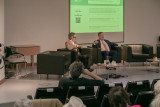
As the world grapples with massive challenges—climate change, rapid urbanisation, digital disruption, and growing inequality—some cities are not waiting for top-down solutions. They are rolling up their sleeves and experimenting with new ways to improve life for everyone, block by block. Amsterdam is one of those cities.
That’s why I was proud to share Amsterdam InChanges approach to smart, inclusive urban innovation at the #CIPPCD2025 conference in Aveiro.
Through our open innovation platform, <strong>Amsterdam InChange</strong>, the city has become a global leader in turning lofty global ambitions into practical, local action. But Amsterdam’s model isn’t built around flashy tech or utopian blueprints. Instead, it’s grounded in an essential question: How can we use innovation to improve people’s everyday lives?
Local Action for Global Challenges
Amsterdam understands that the climate crisis, digital transition, and social inequality can’t be solved by government alone—or by technology alone. That’s why it launched Amsterdam Smart City in 2009 as a public-private partnership. What began as small-scale energy-saving pilots has grown into a community of over 8,500 members, coordinating more than 300 projects across the city and beyond.
The approach is rooted in co-creation. Citizens, companies, knowledge institutions, and government actors come together to design, test, and scale solutions that serve the public good. The values that guide the network are clear: people first, openness, transparency, learning by doing, and public value.
The Doughnut as a Compass
Amsterdam was the first city in the world to embrace Doughnut Economics as a guiding framework. The “City Doughnut,” developed with economist Kate Raworth, helps policymakers balance the city’s ecological footprint with the social foundations that all citizens need: housing, education, health, equity, and more. It’s a tool to align every local decision with both planetary boundaries and human dignity.
This framework has inspired circular construction strategies, neighbourhood energy co-ops, and more inclusive procurement policies. It shows that global concepts can become real when grounded in local practice.
Making Innovation Inclusive
One of Amsterdam’s core beliefs is that smart cities must be <strong>inclusive cities</strong>. That means tackling issues like <strong>mobility poverty</strong>, where rising transport costs and digital-only services make it harder for low-income or elderly residents to get around.
Through the <strong>Mobility Poverty Challenge</strong>, Amsterdam partnered with the Province of North Holland and researchers from DRIFT to understand where and how exclusion occurs—and to design better public mobility systems. Pilot ideas like a “Mobility Wallet” (a subsidy for essential travel) and more inclusive digital apps emerged from real conversations with affected residents.
The same inclusive mindset guides Amsterdam’s digital transformation. In the suburb of Haarlemmermeer, officials flipped the script on e-government. Instead of asking citizens to become “digitally skilled,” they asked how government systems could become more <strong>humane</strong>. This led to simplified interfaces, better access to services, and ultimately more trust.
Responsible Tech and Energy from the Ground Up
Tech transparency is another pillar of the Amsterdam model. The city runs the world’s first <strong>Algorithm Register</strong>, giving the public insight into how AI and automated systems are used in services—from traffic enforcement to housing applications. Anyone can access this register, offer feedback, and better understand how digital decisions are made.
In the energy space, the city supports both bold innovation and careful upscaling. At the <strong>Johan Cruijff ArenA</strong>, used electric vehicle batteries store solar energy, powering concerts and matches with clean backup power. At the same time, a coalition of partners led by Amsterdam InChange is working to scale up Local Energy Systems by collecting lessons learned and creating a toolkit for community-led energy.
What Makes It Work?
If there’s one secret to Amsterdam’s success, it’s the governance model: small, neutral facilitation teams guiding large multi-stakeholder coalitions, anchored by public trust and shared purpose. Regular Demo Days allow project teams to showcase progress, get feedback, and adapt. This culture of transparency and iteration helps avoid the so-called “innovation graveyard,” where pilot projects go to die.
The city also embraces failure—as long as it’s shared and learned from. Reports like “Organising Smart City Projects” openly list lessons, from the importance of strong leadership to the need for viable business models and continuous user involvement.
An Invitation to Other Cities
Amsterdam’s smart city is not a blueprint—it’s a mindset. Start with your biggest local challenge. Bring the right people together. Make space for experimentation. Build bridges between local and global. And, above all, put citizens at the centre.
As international smart city ambassador Frans-Anton Vermast puts it: “We’re not just creating technology for cities—we’re creating better cities for people.”
The III International Conference on Public Policies and Data Science
Demoday #27: Zero Emission City Logistics - The Food Center Amsterdam Case. Hosted by the Interdisciplinary Graduation Circle (HvA)
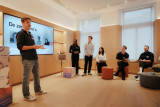
Amsterdam faces a major logistics challenge: from January 2025 onwards, polluting delivery vans will no longer be allowed in the city centre. How can entrepreneurs and suppliers in the food sector prepare for this and turn the transition into a success? Four fourth-year students from the Amsterdam University of Applied Sciences (HvA) are working together in an interdisciplinary graduation circle to find solutions. They are addressing both the technical aspects of this issue and the communication side. Drawing on their different fields of study, they analyse the problem and develop a joint recommendation for the Amsterdam Transport Region (Vervoerregio Amsterdam). As part of their research, they used this working session as a focus group with stakeholders from the Amsterdam InChange network.
Opening of the session
Stan van der Meer (Logistics Management), Chanel Pinas (Digital Marketing), Jay van den Boog (Digital Marketing), and Vanessa Man (Logistics Engineering) opened the session with a few questions to get a sense of the participants in the room. The attendees rated their own level of expertise on the topic and wrote down a word they associated with the issue.
The room was filled with expertise: policymakers from the Municipality of Amsterdam directly involved in the issue, as well as researchers and advisors from Arcadis and Cenex who are actively working on zero-emission logistics. Representatives from the Port of Amsterdam and EIT Urban Mobility (a European network) were also present, each bringing their own perspective on the challenge.
Statements and discussion
The students facilitated the discussion by presenting a number of statements, and moderating the group discussions that followed. Below are a few observations.
Statements 1 and 2 (summarized): Amsterdam entrepreneurs are aware of the new zero-emission policy, and it is clearly presented to them.
There was broad consensus within the group regarding the city’s policy. Communication from the Municipality of Amsterdam has been extensive over the past ten years — first targeting larger logistics partners in the city, and more recently also via letters to local entrepreneurs. In addition, physical signs throughout the city communicate the new regulations. However, what can cause confusion among entrepreneurs are the mixed signals coming from national politics and policies. This can create the impression that there is a lack of determination or vision behind the transition, making entrepreneurs hesitant to invest in new electric vehicles.
Statement 3: There is sufficient support for entrepreneurs to switch to zero-emission transport.
The group also agreed that the municipality is doing a good job offering financial support where needed. Advisors, for example, are available to guide entrepreneurs through the rules and support options. However, it was noted that the target audience still does not always have a clear overview of all the possibilities. While the municipality communicates well and “presents” the available opportunities, confusion and uncertainty remain among entrepreneurs on the streets. This represents an important communication challenge that the students will further explore.
Also, regarding this statement and the ones before, it was noted that the (micro)entrepreneurs and stakeholders we were talking about weren't present in the room. It would have been good to have more of the target group in the room, but for this session specifically the policymakers and specialists from our network were the ones the students focussed on. In the following months of their research, their focus will be on the specialists and (micro)entrepreneurs in the food sector.
Statement 4: Logistics hubs play an important role in reducing transport movements in the city.
This part of the discussion became more technical. The group agreed that a new logistics system with greater use of hubs throughout the city is, in theory, a logical and effective step in this transition. In practice, however, it is not as simple as it sounds. For example, consider the Port of Amsterdam — an existing large hub at the edge of the city for water-based transport. While goods can be transferred there to smaller vehicles for distribution within the city, docking on the busy canals poses a significant challenge. Additionally, water transport was the first sector required to become fully electric, and this system is currently somewhat reduced in scale
Road transport is also complex. Hubs are locations where goods from different suppliers can be combined and delivered with fewer transport movements. But who holds responsibility for these goods if something goes wrong? And how can this be managed without adding too much delivery time?
One of the participants summarized it well: we are shifting from logistics as a chain, where each party is responsible for a small part, to an ecosystem where all actors and the physical infrastructure depend on one another, share collective responsibility, and need to exchange information and services to keep the system running.
In-depth interviews
The second part of the session consisted of two breakout groups in which the students could ask targeted questions for the research they are conducting. Jay and Chanel spoke with several participants about the research side of the project, delving deeper into successful research methods that involve entrepreneurs. Stan and Vanessa spoke with another group of participants about potential solutions for this issue, gathering knowledge about existing innovations and solutions or what might still be needed for this logistical transition.
Follow-up
Through this focus group, the students in this interdisciplinary graduation circle have engaged in dialogue with experts on this topic from various organizations. They also made many new contacts and actively shared their project with the network. During our upcoming Knowledge and Demo Day on June 5, they will once again be part of the program and present their results and potential conclusions.
Would you like to know more about the graduation circle, the research topic, or do you have tips or questions for the students? Feel free to reach out via pelle@amsterdaminchange.com
Stream the Amsterdam Forever Young Programme on Eye Film Player

Discover the Amsterdam Forever Young program on the Eye Film Player, a diverse programme that explores the dynamic, ever-evolving spirit of Amsterdam. This collection of films highlights how the city’s unique identity has been shaped by its past, present, and future. Hence, we place a special focus on the intersection of urban development and planning, offering a look at how the city’s architectural and cultural transformations have intertwined in, both, historical films, as well as more contemporary filmic undertakings. Thus, our collection of films, such as Where the Rats are King, A Photographer Films Amsterdam and Amsterdam Global Village, shed light on the living conditions in Amsterdam, the urban communities witihin Amsterdam and, even, films as Jenny and Amsterdam on Film that shed light on how the canals have shaped Amsterdam more than aesthetically e.g., with its focus on ecology and care for our climate. Through, both, monetized and free to watch films, we aim to share the rich history of our city, whilst aiming for a dynamic space for creativity, inclusivity, and sustainability in the future, too that we hope this knowledge and collection will inspire.
All in all, Amsterdam Forever Young invites you to reflect on the city's evolution and its commitment to being a centre of modernity, without losing the essence of its heritage. Available on the Eye Film Player, to watch from your bedroom, this "digital" exhibition celebrates Amsterdam as the city of urban transformation that, at the same time, stay true to its historical roots.
𝗛𝗼𝘄 𝗰𝗮𝗻 𝗖𝗦𝗥𝗗 𝗯𝗲 𝘁𝗵𝗲 𝗹𝗮𝘂𝗻𝗰𝗵𝗽𝗮𝗱 for 𝘆𝗼𝘂𝗿 𝘀𝘂𝘀𝘁𝗮𝗶𝗻𝗮𝗯𝗶𝗹𝗶𝘁𝘆 𝗷𝗼𝘂𝗿𝗻𝗲𝘆?
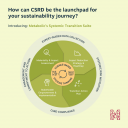
A systems approach is key.
Climate transition plans that lack a systemic perspective can unintentionally shift risks, disrupt supply chains, harm human rights, or even contribute to biodiversity loss. For example, switching to a low-carbon product that requires three times more land may address your carbon goals, but jeopardize your biodiversity targets.
Without considering these interdependencies, your climate strategy may become inefficient and require reworking as new issues arise.
𝗧𝗵𝗲 𝘀𝘆𝘀𝘁𝗲𝗺𝗶𝗰 𝘀𝗰𝗲𝗻𝗮𝗿𝗶𝗼👇
By addressing root causes and considering the ripple effects of climate decision-making in other areas, a systems lens ensures your plan goes beyond regulatory box-ticking.
Together, we can co-create effective action plans with your stakeholders and develop customized decision-making frameworks, accounting for material impacts on climate, nature, and people across your operations and value chain.
How? Learn how our Systemic Transition Suite can unlock your business’s full potential ⬇️
#BeyondCompliance #climatetransition #sustainabilityreporting #CSRD #ESG #circulareconomy
In Residence Open Events program 2025
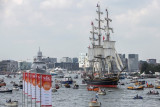
Entrepreneurs test innovations during SAIL and Marathon
Public events like SAIL and the Marathon draw millions of visitors to Amsterdam. These events often take place in central locations where large crowds gather. As a result, various logistical arrangements need to be made, such as providing food and drinks, public toilets, and temporary modifications to streets. These situations pose sustainability and accessibility challenges for the city. However, they also make these events ideal testing grounds for innovations.
Testing with the city and event organizers
The In Residence program offers entrepreneurs the opportunity to test their innovations during public events. They work closely with event organizers, the City of Amsterdam, and an experienced mentor. Additionally, funding is available to support the pilot. If the innovation proves to benefit the city, the municipality may purchase it after the program.
Applications are open from October 1 to November 17. Selected entrepreneurs will prepare their pilot in early 2025, and most pilots will take place during the summer events, especially during SAIL 2025.
Apply via the website: https://innovatiepartners.nl/project/in-residence-open-evenementen-2025
Amsterdam 750th anniversary year
This is the second round of the In Residence Events program. During the 2024 event season, nine entrepreneurs tested their innovations, including at Pride Week, the Marathon, and the Dam tot Dam Run. If successful, innovations from both rounds of the program may be implemented during the events of Amsterdam’s 750th anniversary celebrations.
Interested or any questions? You can get in touch with Mark Stoevelaar (mark.stoevelaar@amsterdam.nl)
Photo: Edwin van Eis
Buurttuinen redden samen ruim 25.000 kilo groente- en fruitafval
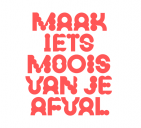
Dankzij de inspanningen van organisatie Afval naar Oogst en honderden vrijwilligers hebben vijftien buurttuinen dit jaar al meer dan 25.000 kilo groente- en fruitafval van de vuilnisbak kunnen redden. Dit resultaat wordt gevierd op 28 september tijdens het Afval naar Oogstfeest. Ook openen er dan elf nieuwe inleverpunten waar Amsterdammers zich kunnen aanmelden om hun gf-afval in te leveren.
Van Afval naar Oogst
Maar liefst een derde van de vuilniszak van Amsterdammers bestaat uit groente-, fruit- en tuinafval, dat nu in de verbrandingsoven belandt. Zonde! Deze keukenresten kunnen we omzetten in een waardevolle grondstof: compost.
Afval naar Oogst maakt het voor Amsterdammers mogelijk om hun schillen en klokhuizen in te leveren bij buurttuinen en stadsboerderijen. De organisatie begeleidt vrijwilligers bij het maken van hoogwaardige compost, die zij weer gebruiken om de tuinen te voeden. Daardoor kunnen er opnieuw groenten, kruiden, fruit en bloemen groeien. Van afval naar oogst dus!
Wist je dat de tuin elk jaar compost nodig heeft om de bodem en dus de planten gezond te houden?
Laagdrempelig en lokaal
Afval naar Oogst begon met één locatie in Amsterdam-West en is inmiddels uitgegroeid tot 22 plekken verspreid over de stad. Tijdens het Afval naar Oogstfeest kunnen bezoekers daar onder andere uitleg krijgen over composteren én zich aanmelden als groente- en fruitafval donateur.
Deelnemer van het GWL-terrein in West: “Ik ben zo blij dat ik in mijn buurt makkelijk een duurzame bijdrage kan leveren. Hier was ik jaren naar op zoek.”
Mooi programma
Tijdens het Afval naar Oogstfeest kun je ook ontdekken wat je nog meer met keukenafval kunt doen. Doe bijvoorbeeld mee aan een workshop verf maken met groenteschillen. Of verdiep je in de wonderlijke wereld van de bodem. In Amsterdam-West kun je meedoen aan een speciale Afval naar Oogst fietsroute! Meer informatie over het programma en de deelnemende locaties vind je op de website of sociale media van Afval naar Oogst. Aanmelden is niet nodig.
Afval naar Oogst slaat aan
Honderden stadsbewoners leveren inmiddels hun groente- en fruitafval in. Ook de gemeente Amsterdam is enthousiast. De stad wil in 2030 zeker 75% van het gft-afval hergebruiken. Afval naar Oogst helpt daarbij door bewustwording te vergroten. Initiatiefnemer Natascha Hagenbeek: “In onze tuinen kunnen Amsterdammers de kringloop zien en ervaren. Compost maken van ‘afval’ is al een prachtig proces. Er vervolgens groente en fruit uit te zien groeien, is betoverend.”
Building local mini-economy within planetary boundaries

Scroll naar beneden voor de Nederlandse versie
Growth is an end in itself, dictates the current economic model. For only growth would keep our economy going and be indispensable to further sustainability. At the same time, our planet is being depleted by this drive for green growth.
Is it time to abandon economic growth as a social ideal? And then what are workable, more social alternatives?
More and more business owners are opting for sustainable operations. They settle for less financial gain to do valuable work with positive social and environmental impact. The rise of the commons movement, housing-, energy- and food cooperatives, as well as social initiatives in health and welfare, show that people want to stand together for values other than financial gain.
Achievable and real alternatives
New economic models offer different perspectives for considering the economy as part of a society. They offer tools to make that economy more equitable and sustainable. Yet the new economic thinking is still often dismissed as unrealistic and unachievable. Only by trying out these theories in practice can we demonstrate that these are real alternatives.
New economic thinking, New economic acting
To experiment with new economic theory and models in practice, the Amsterdam Economic Board has started the New Economic Models exploration. In April, we introduced the living lab project “New Economic Thinking, New Economic Acting” at the Marineterrein in Amsterdam. In this we work on socio-economic experiments, together with AMS Institute, AHK Culture Club, And The People, Bureau Marineterrein, Kennisland, The Next Speaker and the knowledge coalition ‘Art, Tech & Science’.
The Marineterrein is the ideal place to do this because it is an official experiment site. Moreover, companies located here are often already working on circular and social projects. Cultural institutions and organisations at the Marineterrein, in turn, can represent what thriving without economic growth could look like and fuel our desire for a new economy.
-----------------------------------------------------------------------------------------------------------------------
Bouwen aan lokale mini-economie binnen planetaire grenzen
Groei is een doel op zich, dicteert het huidige economische model. Want alleen groei zou onze economie draaiende houden en onmisbaar zijn om verder te verduurzamen. Tegelijkertijd raakt onze planeet uitgeput door die drang naar groene groei.
Wordt het tijd om economische groei als maatschappelijk ideaal los te laten? En wat zijn dan werkbare, socialere alternatieven?
Steeds meer ondernemers kiezen voor een duurzame bedrijfsvoering. Zij nemen genoegen met minder financiële winst om waardevol werk te kunnen doen, met positieve sociale en ecologische impact. De opkomst van de commons-beweging, woon-, energie- en voedselcoöperaties en maatschappelijke initiatieven in zorg en welzijn, laten zien dat mensen zich samen sterk willen maken voor andere waarden dan financieel gewin.
Haalbare en reële alternatieven
Nieuwe economische modellen bieden andere perspectieven om de economie als onderdeel van een samenleving te beschouwen. Ze bieden handvatten om die economie rechtvaardiger en duurzamer in te richten. Toch wordt het nieuwe economisch denken nog vaak weggezet als onrealistisch en niet haalbaar. Alleen door deze theorieën in de praktijk uit te proberen kunnen we aantonen dat dit reële alternatieven zijn.
Nieuw economisch denken, Nieuw economisch doen
Om te kunnen experimenteren met nieuwe economische theorie en modellen in de praktijk, verkent Amsterdam Economic Board deze in de verkenning Nieuwe economische modellen. In april introduceerden we het proeftuinproject ‘Nieuw economisch denken, Nieuw economisch doen’ op het Marineterrein in Amsterdam. Hierin werken we aan sociaaleconomische experimenten, samen met AMS Institute, AHK Culture Club, And The People, Bureau Marineterrein, Kennisland, The Next Speaker en de kenniscoalitie ‘Art, Tech & Science’.
Het Marineterrein is de ideale plek om dit te doen, omdat het een officieel ‘experimentterrein’ is. Bovendien zijn de hier gevestigde bedrijven vaak al bezig met circulaire en sociale projecten. Culturele instellingen en organisaties op het Marineterrein kunnen op hun beurt verbeelden hoe bloei zonder economische groei er uit kan zien en ons verlangen aanwakkeren naar een nieuwe economie.
Data Dilemma's verslag: De Voedseltransitie
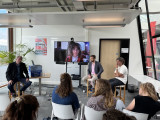
Op 30 mei nodigden we onze community uit bij AMS Institute op het Marineterrein voor een Data Dilemma’s event over de Voedseltransitie. Het ging deze middag over technische dilemma’s rond data en de verduurzaming van voedselketens, en; wat is nou echt lokaal voedsel?
Data Commons: Een digitaal gemeenschapsgoed met een gezamenlijk doel
Jan Wester, directeur van Big Data Value Center, vertelde ons meer over het project ‘Data Value Center Agri & Food Korte Keten’. Aanleiding voor dit project is de transitie naar een duurzamer voedselsysteem waarbij digitalisering en data een belangrijke rol spelen. Er is de wens dat relatief meer voeding uit de regio komt (in plaats van langere ketens), dat er meer transparantie en efficiëntie is in ketensamenwerking en dat er meer informatie wordt vastgelegd over productie en herkomst (denk aan True Pricing). Dit vraagt om een neutraal precompetitief platform. Dit platform kan je zien als een zogenaamde Data Commons: een digitaal gemeenschapsgoed waarin je samen afspraken maakt over het delen van data; wat deel je, met wie, en wat is het gezamenlijke doel ermee?
De Agrifood Data Common is een veilige data-deel omgeving/marktplaats/dashboard, met verschillende gebruikersgroepen. Ondernemers kunnen hiermee bijvoorbeeld markten transparanter maken, ketensamenwerking verbeteren en meervoudige verdienmodellen creëren. Overheden kunnen gebruik maken van de omgeving voor meer evidence-based beleid en het monitoren van impact. Ten slotte kunnen kennisinstellingen gebruik maken van het platform voor de opbouw van referentiedata en het delen van data uit experimenten en fieldlabs. Belangrijk is dat de verschillende partijen vertrouwen met- en in elkaar opbouwen om dit samen te laten werken.
De cateringketen van de Hogeschool van Amsterdam als case
DVC Agri & Food is samen met partners cases aan het bouwen die het nut en belang van dit digitale gemeenschapsgoed in de praktijk tonen. Kees Willem Rademakers van de Hogeschool van Amsterdam vertelde ons meer over het ‘Food Governance 2.0’ project met betrekking op hun eigen cateringketen.
De HvA wilt zich actiever afvragen wat ze van (hun) voedsel vinden en hoe ze een nieuwe rol kunnen spelen in hun eigen lokale voedselsysteem. Ze kijken naar factoren als gezondheid, biodiversiteit, betaalbaarheid en energiegebruik. Als je hier kritisch naar wilt kijken blijkt hoe moeilijk het is om te onderzoeken waar kantineproducten precies vandaan komen. De precieze oorsprong, de reizen die het afgelegd heeft, de arbeidsomstandigheden; het zijn onderdelen waar je als afnemer grip op- of in ieder geval een beeld van wilt hebben. Er is nu een ongelijke machtsverdeling waarbij de leverancier meer data over de keten bezit en dit gebruikt als verdienmodel.
Binnen een keten die digitaal en transparant is georganiseerd, kan de HvA zien wat er nu gebeurt, kan er onderhandeld worden, en kunnen ze samen gaan hervormen waar ze naartoe willen. Het is belangrijk om daarom de governance structuren over voedselketens en de informatiestructuren daarbinnen opnieuw vorm te geven met elkaar. Jan Wester en Kees Willem Rademakers concluderen samen dat deze hervorming vooral zit in wederkerigheid en bereidheid om meer data met elkaar te delen, en de digitale platformen die dit mogelijk maken.
Flevo Campus: Samen werken aan het stedelijk voedselsysteem van de toekomst
Lenno Munnikes vertelde ons meer over lopende initiatieven bij de Flevo Campus. Een organisatie waar onderzoek, onderwijs, ondernemerschap en overheden samenkomen om samen te werken aan het stedelijke voedselsysteem van de toekomst. Hier verbinden ze economische, maatschappelijke en kennis-vraagstukken op het gebied van een duurzame voedseleconomie en een gezonde voedselomgeving.
In een project rond ‘de supermarkt van de toekomst’ zijn ze aan het experimenteren met het verbreden van het assortiment van lokale producten in de schappen. Als je een deel van een supermarkt bijvoorbeeld reserveert voor lokale ondernemers, ontstaat er al sneller een match tussen lokale consumenten en lokale producenten. Ook wordt er gekeken hoe je stadstuinderijen kan ontwikkelen met een mix van verschillende functies. Naast voedselzekerheid, kan zo’n plek ook een belangrijke educatiefunctie vervullen voor kinderen en jongeren in de buurt, kan er onderzoek plaatsvinden, kunnen er nieuwe verdienmodellen worden uitgeprobeerd, en kan de tuin gekoppeld worden aan een zorgcentrum in de buurt.
Ten slotte vertelde Lenno over hun projecten in de zogenaamde Labs. Hier experimenteren ze op kleine schaal om ons aan het denken te zetten over ons voedselsysteem. Een bekend voorbeeld is het hergebruiken van de ‘reststromen’ van de kip. Na slachting wordt zo’n 70% van het dier als reststroom verscheept naar andere continenten. Maar wat als je nou alles van de kip verwerkt? Hoe kan je omgaan met onderdelen van een dier dat je niet opeet? Met deze vragen gingen ze aan de slag en creëerden ze bijvoorbeeld een tasje van de huid, zeep van het vet en keramiek van de botten. Een experiment als dit kan op kleine schaal worden uitgevoerd, maar via nieuwskanalen veel mensen bereiken en aan het denken zetten over ons voedselsysteem.
Onderzoek naar de klimaatimpact van een voedselketen; van verantwoording naar nieuwsgierigheid
Leen Felix, adviseur Agrifood en Biodiversiteit bij Metabolic, nam ons mee in het proces waarmee ze bedrijven adviseert over de duurzaamheid van hun voedselketen. Het begint simpel, bij de ingrediëntenlijst van een product. In plaats van de locatie van de leverancier, moet je echt op zoek naar de productielocatie; het land van herkomst per ingrediënt. De impact van voedselproductie hangt namelijk af van de combinatie van het productieproces en de productielocatie. Maten van landgebruik, bodemtransformatie en uitstoot van broeikasgassen, bijvoorbeeld, hebben ieder een effect op de natuurlijke omgeving. De ruimtelijke context bepaald hoe schadelijk deze processen zijn voor de aarde en het klimaat. Je kan hierbij denken aan de volgende voorbeelden: Het verbouwen van soja, waarbij veel land voor nodig is, is schadelijker als er regenwoud in Brazilië voor wordt gekapt. Het transformeren en homogeniseren van de bodem is schadelijker voor het klimaat, als dit gebeurt op een plek waar voorheen een relatief hoge mate van biodiversiteit aanwezig is. Water-intensieve productieprocessen hebben meer impact op mens en natuur als het plaatsvind op locaties waar water schaars is.
Metabolic koppelt daarom ruimtelijke context aan productieprocessen. Via scores is te zien hoe de negatieve impact van productieprocessen nog sterker is in ‘gebieden met een gevoeligheid’. Dit legt de complexiteit vast waar je in mondiaal voedselsysteem mee te maken hebt. Hoe meer ingrediënten in een product, hoe meer productielocaties, hoe meer factoren die de klimaatimpact beïnvloeden. Het is voor Leen als analist en adviseur de balans zoeken tussen het weergeven van álle data en de complexiteit van de keten, en het adviseren met een platgeslagen verhaal waar de opdrachtgever soms naar op zoek is. Je wilt een bedrijf niet verlammen met de data, maar ze ook wel gericht handvatten geven om bijvoorbeeld risicolocaties en ingrediënten te vermijden.
Leen sluit af met een drietal lessen voor het publiek:
- Perfecte data bestaat niet, en dat is niet eens zo erg: focus op het verhaal wat je ermee kan en wilt overbrengen.
- Van verantwoording naar nieuwsgierigheid: Je kan dus niet 100% verantwoorden en berekenen, maar je moet wel een nieuwsgierige houding tonen over bijvoorbeeld alle bijkomende milieulasten en context risico’s.
- Geen top 10 maar systeemdenken: Duurzaamheid als een simpel thema laten vallen, het is geen top 10 maar denk in systeem met contrasten, schaal, complexiteit, ruilfuncties. ‘One size fits all’ oplossingen werken niet.
Dank aan de sprekers voor hun verhalen en het publiek voor de levendige discussies na afloop. Wil je bij onze volgende Data Dilemma's zijn? De volgende editie van deze serie open events vindt plaats op 16 juli. Ook staan we altijd open voor nieuwe thema’s en onderwerpen voor deze serie; we zijn benieuwd wat voor data dilemma’s jij mee in aanraking komt bij je werk!
Ondernemers met duurzame oplossingen gezocht voor aanbesteding
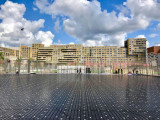
De aanbesteding Scale Up Toekomstbestendige kunstgrasvelden is gepubliceerd. Met het project dagen de gemeenten Amsterdam en Haarlem ondernemers uit om duurzame oplossingen op kunstgras sportvelden toe te passen. De inschrijving hiervoor sluit op 17 juni 2024 om 14.00 uur.
De genoemde gemeenten zijn op zoek naar partijen met innovaties op het gebied van: duurzame energie, klimaatadaptie, circulariteit of slim en schoon bouwen. De duurzame oplossingen willen ze vervolgens toepassen bij de vervanging en nieuwe aanleg van kunstgras sportvelden. Naar verwachting staan er de komende tien jaar meer dan 200 velden op het programma. Hiermee wordt verwacht een grote bijdrage te leveren aan de doelstelling van de gemeenten Amsterdam en Haarlem om in 2050 een klimaatneutrale stad te zijn.
Doe mee!
Doe mee met dit project en schrijf je in voor de aanbesteding op Mercell.
Kijk voor meer informatie op de website van het project of stel je vraag door een e-mail te sturen naar sportveldvandetoekomst@amsterdam.nl.
Disclaimer: Het project wordt medegefinancierd door het LIFE Programme van de Europese Unie. Noch de Europese Unie, noch de subsidieverlenende autoriteit kan voor de inhoud van het project verantwoordelijk worden gehouden. Aan dit artikel kunnen geen rechten worden ontleend, de aanbestedingsdocumenten zijn leidend.
Reducing Carbon Footprints: Erasmus MC Leads the Way to Climate-Neutral Hospitals
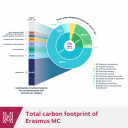
The healthcare sector is responsible for approximately 7% of all greenhouse gas emissions in the Netherlands. How can a hospital become climate-neutral?
The first step on the sustainability journey is to measure the organization’s carbon footprint. A precise carbon footprint is crucial for setting impactful and realistic targets, and for aligning with regulations and Green Deal Healthcare 3.0.
In support of Erasmus Medical Center's sustainability goals to reduce its CO2e emissions by 55% by 2030 and to achieve climate neutrality by 2050, Metabolic mapped its carbon footprint, focusing on scope 1, 2, and 3 emissions.
💡A sneak peek: 60% of Erasmus’ CO2e footprint results from indirect emissions from purchased goods and services, such as medicines.
Erasmus MC is one of the first hospitals to use this method to map emissions across all its operations. This research provides the hospital—and the entire sector—with insights into emission hotspots and highlights potential areas for impactful sustainability interventions.
Explore Metabolic's work with Erasmus in the link below
Interested in learning more about carbon footprint assessment? This is for you: https://bit.ly/3UUdMHf
#sustainability #carbonfootprintassessment #environmentalimpact #sustainablehealthcare
Samenwerken aan transitievraagstukken; wat is er nodig? - Opbrengsten van het Amsterdam Smart City partnerdiner 2024
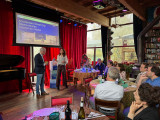
Als Amsterdam Smart City netwerk bijten we ons vast in complexe stedelijke transitievraagstukken. Ze zijn complex omdat doorbraken nodig zijn; van kleine doorbraakjes, tot grotere systeem doorbraken. Denk aan bewegingen rond; organisatie-overstijgend werken, domein-overstijgend werken, en van competitief naar coöperatief. Als netwerk zetten we samenwerkingsprojecten op waarin we gaandeweg ondervinden met wat voor barrières we te maken hebben en wat voor doorbraken er nodig zijn.
Tijdens ons jaarlijkse Partnerdiner op 2 april, hadden we het samen met eindverantwoordelijken van onze partnerorganisaties over de strategische dilemma’s die spelen bij transitievraagstukken. Als gespreksstarters gebruikten we onze lopende onderwerpen van 2024: De coöperatieve metropool, de ondergrond, de circulaire metropool en drijvende wijken. De gesprekken aan tafel gingen echter over wat er aan de basis staat van het werken aan transitievraagstukken. Zo ging het bijvoorbeeld over; het samenwerken aan visies en scenario’s, leiderschap, burgerlijke ongehoorzaamheid en de kracht van coöperaties. In dit artikel bespreek ik beknopt een aantal onderwerpen die onder de aandacht werden gebracht door onze gasten.
Belangen en visie organiseren
Bij een vraagstuk of onderwerp als de ondergrond, gaan we het al snel hebben over de data en de oplossingen. Dat is ‘te makkelijk’. Technisch gaat het allemaal wel kunnen, maar als we daar te snel beginnen met de oplossing lopen we over een aantal jaar weer vast. Het is belangrijk om eerst een stapje terug te doen en een gedeeld belang en gedeelde visie te organiseren.
Hoe je belanghebbenden verzamelt, en de methode om tot een gedeelde visie te komen, dat is wat meer aandacht verdient. Neem het ondergrond vraagstuk als voorbeeld. Op welke schaal organiseer je daarvoor de belanghebbenden? Aan de oppervlakte hebben we Gemeentelijke en Provinciale grenzen, maar in de ondergrond liggen netwerken van kabels en leidingen die op andere schaal zijn geïnstalleerd en hebben we te maken met bodemtypologieën met verschillende behoeften.
Samen voorstellen en voorspellen
Dat waar je naartoe wilt werken, dat moet van iedereen voelen. Het is belangrijk om een setting te creëren van gedeeld eigenaarschap, waarin iedereen zich ook gehoord voelt, en dat je voelt dat de mensen met wie je gaat samenwerken ook voor jouw belangen op zullen komen. Om samen tot een visie te komen, is het belangrijk om te werken aan scenario’s en die samen te doorleven. Je moet het dan niet alleen hebben over waar je heen wilt, maar ook uitwerken wat er gebeurt als je niets doet of als het helemaal verkeerd uitpakt.
De scenario’s zouden op waarden moeten rusten. Het beeld wat bij de scenario’s hoort is veranderlijk, maar de waarden niet. Samen ben je continu in samenspraak over wat de waarden betekenen voor het verhaal dat je creëert.
Leiderschap en een interdisciplinaire werkwijze
Transitievraagstukken en bovenstaande aanpakken verdienen een bepaald soort leiderschap. Zo zou een leidinggevende bijvoorbeeld een veranderlijke en faciliterende houding moeten tonen, en moet hij/zij vanuit waarden werken die inspireren en verbinden. Het zou meer moeten gaan over het faciliteren van doeners, het stimuleren van doelgericht samenwerken in plaats van taakgericht en ruimte bieden voor menszijn en persoonlijke expertises. Met dit laatste wordt verwezen naar een stukje burgerlijke ongehoorzaamheid. Om dingen die we belangrijk vinden in gang te zetten moeten we soms even los kunnen denken van onze organisatiestructuren en functies. We zouden wel wat vaker mogen appelleren aan ons menszijn.
Meer faciliteren en minder hiërarchie helpt ons om beleid en praktijk dichter bij elkaar te brengen, en om van competitief naar meer coöperatief te bewegen. Als je naar de uitvoering gaat mag de kracht verplaatsen naar de uitvoerders. De machtsverschuivingen tussen leidinggevenden en de doeners, met specifieke rollen en expertises, mag in een constante wisselwerking rond gaan.
Ook interdisciplinair samenwerken aan transitievraagstukken zal nog meer moeten worden gestimuleerd, en misschien wel de norm moeten worden. Bij overheden en bestuurders bijvoorbeeld, zijn transitie thema’s verdeeld over domeinen als energie, mobiliteit, etc. maar de vraagstukken zelf zijn domein overstijgend. Als voorwaarde zou je kunnen stellen dat je altijd twee transities aan elkaar moet koppelen. We zouden meer inspirerende voorbeelden moeten laten zien waarbij verschillende domeinen en transities aan elkaar worden gekoppeld, door bijvoorbeeld overheden.
Publiek-privaat-civiel
Publieke, private en civiele partijen zouden nog meer naast elkaar aan tafel mogen, in plaats van tegenover elkaar. Bedrijven kunnen verzuild zijn, of zich zo voelen, en zouden nog meer om zich heen kunnen kijken en samenwerken. Niet alleen met overheden, maar ook met civiele organisaties. Er zijn vaak meer gezamenlijke belangen dan we denken.
In een beweging naar niet-competitief samenwerken kunnen coöperaties een belangrijke factor zijn. Wanneer je meer autoriteit bij coöperaties neerlegt, weet je zeker dat er in de basis voor een wijk, een stad, haar inwoners, een publiek belang wordt gewerkt. Er liggen dan ook veel kansen bij een faciliterende houding vanuit de overheid naar coöperaties toe, en in de samenwerking tussen bedrijven en coöperaties.
Er zijn tijdens dit diner veel onderwerpen aan bod gekomen waar we met het netwerk mee aan de slag kunnen in onze programmering. De input wordt gebruikt voor onze lopende vraagstukken en we gaan de komende tijd in gesprek met partners om te kijken of we van start kunnen met verdiepende sessies of het ontwikkelen van methoden op (enkele van) deze onderwerpen.
<em>Wil je doorpraten over deze onderwerpen, met ons - of een van onze partners? Mailen kan naar pelle@amsterdamsmartcity.com*</em>
Recycling start-up Droppie has announced their first recycling hub in Amsterdam

Droppie, the innovative recycling start-up, is gearing up to open its first recycling hub in Amsterdam starting June 2024.
At Droppie, we're on a mission to make the world a cleaner place by adding value to recyclables. We've developed a unique collection system and a handy mobile app that rewards users for responsibly recycling all sorts of materials, from textiles to plastics to e-waste!
Bag it. Drop it. Cash it.
Stay tuned for more updates as we countdown to our official launch. Get ready to join us on this exciting journey as we continue to innovate, grow, and make a difference together!
Join AMS Institute's Scientific Conference, hosted by TU Delft, Wageningen University & Research, MIT and the City of Amsterdam.

Do you want to learn from and network with the best researchers and scientists working to tackle pressing urban challenges?
AMS Institute, is organizing the AMS Scientific Conference from April 23-25 at the Marineterrein, Amsterdam, to address pressing urban challenges. The event is organized in collaboration with the City of Amsterdam.
The conference brings together leading institutions in urban research and innovation, thought leaders, municipalities, researchers, and practitioners to explore innovative solutions for sustainable development in Amsterdam and other global cities.
Keynotes, research workshops, learning tracks, and special sessions will explore the latest papers in the fields of mobility, circularity, energy transition, climate adaptation, urban food systems, digitization, diversity, inclusion, living labs experimentation, and transdisciplinary research.
Attendees can expect to gain valuable insights into cutting-edge research and engage in meaningful discussions with leading experts in their field. You can see the full program and all available sessions here.
This year's theme is 'Blueprints for messy cities? Navigating the interplay of order and messiness'.
The program
Day 1: The good, the bad, and the ugly
Keynotes by Paul Behrens of Leiden University and Elin Andersdotter Fabre of UN-Habitat will be followed by a city panel including climate activist <strong>Hannah Prins</strong>. The first day concludes with a dinner at the Koepelkerk in Amsterdam: you're welcome to join our three-course meal with a 50 euro ticket.
Day 2️: Amazing discoveries
Keynotes by Carlo Ratti of MIT and Sacha Stolp of the Municipality of Amsterdam discuss innovation and research in cities. <strong>Corinne Vigreux</strong>, co-founder of TomTom, and Erik Versnel from Rabobank will participate in the city panel.
Day 3️: We are the city
Keynotes by Paul Chatterton of Leeds University and Victor Neequaye Kotey Deputy Director of the Waste Management Department of the Accra Metropolitan Assembly, Ghana. They discuss how we shape the future of our cities together. This will be followed by a city panel including Ria Braaf-Fränkel of WomenMakeTheCity and prof. dr. Aleid Brouwer of the Rijksuniversiteit Groningen.
To buy tickets: You can secure your conference tickets through our website.
Dinner tickets: On April 23 we’re hosting a dinner at the Koepelkerk in Amsterdam. Tickets for this can be added to your conference pass or bought separately.
Amsterdamse ziekenhuizen gaan data delen
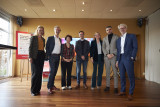
Amsterdam UMC, OLVG en het Antoni van Leeuwenhoek (AVL) gaan elkaars medische data gepseudonimiseerd hergebruiken in Health Data Space Amsterdam.
HDSA is een geheel nieuwe, regionale zorgdata-infrastructuur. Deze ondersteunt patiëntenzorg en medisch wetenschappelijk onderzoek naar gezondheid en preventie. Met als doel: gezondheidsverschillen in de regio te verkleinen en de gezondheidszorg toegankelijk te houden.
Het initiatief van de drie Amsterdamse ziekenhuizen komt voort uit een bredere samenwerking met de Universiteit van Amsterdam, Vrije Universiteit Amsterdam, Gemeente Amsterdam, Amsterdam Economic Board en Philips. Verder trekken de ziekenhuizen nauw op met Amsterdam AI, het Amsterdamse samenwerkingsverband voor kunstmatige intelligentie, en Health-RI, dat zich inzet voor een landelijke geïntegreerde gezondheidsdata-infrastructuur voor onderzoek, beleid en innovatie.
HDSA faciliteert met deze betere en snellere uitwisseling van zorgdata wetenschappelijk onderzoek naar gezondheid, beter medisch inzicht in hoe mensen langdurig gezond kunnen blijven, gepersonaliseerde preventie en behandeling van ziekten. De samenwerking is een eerste stap in de aansluiting op (een nog te bouwen) nationale infrastructuur vanuit het Integraal Zorgakkoord (IZA) en een Europese samenwerking via het European Health Data Space (EHDS).
Lees het complete bericht via
Unlocking circular innovation: Launch of the Circular Innovation Collective program guide

Exciting news! We're happy to announce the launch of the Circular Innovation Collective program guide!
Launched during the #WeekofCircularEconomy2024, the guide is a practical roadmap for local governments to foster circular innovation within their cities and regions.
Gathering insights from its first pilot program in the Metropolitan Region Amsterdam, the guide offers practical and comprehensive instructions for scoping out, designing, and executing local innovation programs. Here’s what Egon van Wees from Amsterdam Impact said about the program:
"To transition to an impact economy we need to radically change our approach. We need to work with front runners and entrepreneurs that tackle societal challenges and influence the broader ecosystem. With the CIC approach you can do just that.” - Egon Van Wees, Program Coordinator, Amsterdam Impact (CIC program Funder).
Wanting to empower other cities and regions across Europe, the CIC is sharing its FREE program guide to accelerate the transition to the new circular economy.
Download the guide in the link below
The Circular Innovation Collective is a consortium of impact-driven organizations initiated by Metabolic, Impact Hub Amsterdam, and Bankers without Boundaries. With the support of the City of Amsterdam (Amsterdam Impact), The DOEN Foundation, and Goldschmeding Foundation, this initiative specifically targeted achieving 70% circular textiles in the Metropolitan Region Amsterdam by 2030. Demonstrating the potential for impactful change, CIC is now dedicated to sharing its knowledge, experience, and strategies in an open-source manner.
#circularinnovationcollective #circularcities #ventures
Exploring Smart Parking Solutions in Amsterdam: The Role of Mobypark in Shaping Urban Efficiency

The quest for parking in Amsterdam presents a unique set of challenges, including narrow lanes, constant vehicular flow, and strict parking policies. This iconic city, celebrated for its canal system, historical buildings, and cultural vibrancy, also faces the modern urban dilemma of parking scarcity. Amidst these challenges, Amsterdam's approach to parking, characterized by a zonal system with variable rates, mirrors its commitment to promoting sustainable urban mobility. Within the bustling heart of the city, parking fees can soar to €7.50 per hour, a pricing strategy designed to incentivize public transport and biking, cherished and eco-friendly travel methods among the locals.
Amsterdam's dynamic parking strategy also paves the way for innovative solutions like Mobypark, a platform revolutionizing parking by facilitating the rental of private parking spots. This initiative not only offers a cost-effective alternative to the traditional parking hunt but also optimizes the use of existing spaces, aligning with the city's sustainability goals.
For those seeking affordability without sacrificing convenience, Amsterdam's Park and Ride (P+R) facilities serve as a beacon. Strategically located at the city's periphery, these parking havens offer reduced rates, encouraging drivers to park their vehicles and hop on public transport to reach the city's core. This system significantly mitigates urban congestion and lowers parking costs for both tourists and daily commuters.
The allure of P+R locations is undeniable, especially when juxtaposed with the exorbitant costs of street parking. To access P+R discounts, users must integrate their parking with public transportation, highlighting the city's efforts to weave sustainability into the fabric of urban travel. Mobypark's P+R options stand out for their simplicity and affordability, offering seamless access to the city center without the usual prerequisites. Examples include:
Amsterdam's strategy to curtail on-street parking availability is a deliberate move towards fostering a more sustainable, pleasant cityscape. By endorsing alternatives like public transport, cycling, and Mobypark's innovative parking solutions, Amsterdam is making strides in reducing traffic jams, cutting down on pollution, and improving urban life quality. These initiatives are testament to Amsterdam's dedication to a sustainable future, highlighting Mobypark's pivotal role in transforming the city into a smarter, more navigable urban space.
Find a link to Mobypark here: Amsterdam parking
Open evenementen voor het testen van innovatie [Innovation wanted!]
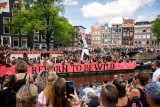
Evenementen in de stad willen we verder verduurzamen en toegankelijker maken. Vaak vinden evenementen plaats op centrale plekken waar mensen bij elkaar komen en waar veel afval, drinkwater en consumptievoorzieningen zijn. Dit zijn goede plekken om nieuwe innovaties te testen en verder te ontwikkelen. Tot 29 februari kunnen ondernemers zich inschrijven om hun innovatie te testen via het In Residence programma Open Evenementen.
In Residence programma
Innovatieve ondernemers kunnen zich inschrijven voor het In Residence programma van het stedelijk innovatieteam, waarin open evenementen in Amsterdam worden ingezet voor het testen van innovaties. Het doel van dit programma is om kennis te ontwikkelen voor zowel het verduurzamen van evenementen, als voor het vinden van praktische oplossingen voor een toekomstbestendige stad.
Geselecteerde ondernemers krijgen daarbij professionele begeleiding bij het verder ontwikkelen van hun innovatie en de mogelijkheid samen te werken met ambtenaren en evenementenorganisatoren. Voor het testen van hun innovatie krijgen ondernemers een budget tot €15.000,- toegewezen. Het programma duurt 6 maanden, van mei tot en met oktober 2024. Op 26 april worden de 8 ondernemers bekend gemaakt die dit jaar aan het programma mee zullen doen.
Het In Residence programma Open Evenementen vindt plaats in aanloop naar het jubileumjaar 2025 – het jaar van Amsterdam 750 en SAIL – dat groots gevierd zal worden in de hele stad. Innovaties die de komende tijd op evenementen worden getest en door ontwikkeld kunnen mogelijk een rol hebben tijdens de grootschalige evenementen die dat jaar plaatsvinden.
Evenementen als proeftuin
Meerdere grote evenementen nemen deel aan het programma. De organisaties van onder andere Pride en de Marathon bieden geselecteerde ondernemers mogelijkheden om innovaties op thema’s als duurzaamheid, circulair, mobiliteit, inclusie en toegankelijkheid te testen tijdens deze evenementen. Kansrijke innovaties krijgen hierdoor de mogelijkheid om door te ontwikkelen en een positieve bijdrage te leveren aan de opgaven van de stad.
Innovatieve ondernemers kunnen innovaties opgeven binnen de volgende thema's:
- Voedsel
- Circulaire materialen
- Circulaire verpakkingen
- Mobiliteit
- Inclusiviteit en toegankelijkheid
- Extreem weer
- Digitale veiligheid
Er is ook een wildcard voor een kansrijke innovatie die buiten deze categorieën valt.
De Inschrijving verloopt via: https://innovatiepartners.nl/project/open-evenementen-2024/ en sluit op 29 februari.
Meer informatie over hoe wij samenwerken met ondernemers vind je op:www.innovatiepartners.nl. Op 6 en 8 februari vinden er twee informatiewebinars plaats waarin meer verteld zal worden over het In Residence programma en de selectieprocedure. Ook is er dan ruimte om vragen te stellen.
Recap of Demoday #22
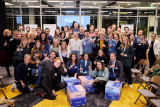
On Thursday December 14th, Amsterdam Smart City partners concluded 2023 with an afternoon full of inspiration, exchange and connections at our 22nd Demoday! Our partner Deloitte welcomed our network in The Garage, where their ‘Deloitte Studios’ department is located. In this article, we’ll give you a quick overview of the Knowledge Session, Work Sessions and Pitches. Interesting in learning more? Read the full reports by our Programme Managers Noor, Pelle and Sophie (linked below).
About our Demodays
The Demodays are one of the tools we use to stimulate innovation and encourage connection between our partners and community. The purpose of the Demodays is to present the progress of various innovation projects, ask for help, share dilemmas and involve more partners to take these projects to the next level. More information about the Demodays can be found here.
Knowledge Session: Change in the here and now, with Theory U
To kick-off our final Demoday of 2023, our brand-new partner Hieroo led an inspiring knowledge session about the change method they use for social innovation in the city: Theory U. Dorien Schneider and Maartje Krijnen taught us more about this methodology and how it can help us solve complex problems by shifting from ego to eco-thinking. Read the full report here.
Work sessions
After the plenary Knowledge Session we split up in different worksessions, each exploring regional innovation challenges. As always, we had set up the sessions’ topics and moderation in collaboration with our partners.
Mobility | Decision-making along the principles of Inclusive Prosperity – Jurhan Kwee (Municipality of Amsterdam)
In The Netherlands, the concept of ‘Inclusive Prosperity’ is on the rise. Policy makers are busy defining this concept, figuring out how to put this concept into practice and what it means for their decision-making process. Together with his colleagues at the Municipality of Amsterdam, Yurhan Kwee hosts sessions on decision-making along the principles of Inclusive Prosperity. With the input he gathers, he hopes to make the decisions needed for our Inclusive Prosperity ambitions more understandable and transparent, both for Amsterdam’s administrators and councillors as well as its citizens. Read Pelle’s recap article here.
Digital | Data Commons Collective: Using data for a liveable city – Lia Hsu (Amsterdam Economic Board) and Simone van der Burg (Waag)
In the big tech-dominated era, data has been commercially exploited for so long that it is now hard to imagine that data sharing might also benefit the community. Yet that is what a collective of businesses, governments, social institutions and residents in Amsterdam aim to do. Sharing more data to better care for the city. On behalf of the Data Commons Collective, Lia Hsu (Strategic Advisor at Amsterdam Economic Board) asked the Amsterdam Smart City network for input and feedback on their Data Commons initiative. Read Sophie's recap article here.
Energy | How can we continue to facilitate the homeowner in driving the energy transition? | Wouter van Rooijen (Alliander)
Wouter van Rooijen (Alliander) discussed the challenges related to grid congestion. From 2030 onwards, it is expected that a significant portion of the low-voltage network will experience both over- and under-voltage. While the network will be reinforced as quickly as possible, the lack of labour capacity is also prompting the consideration of alternative solutions.
The solution that emerged from Wouter's co-creation process was WijkWise. In this work session, Wouter aimed to validate the WijkWise concept and find parties that could contribute to its development and market implementation. Dave van Loon from Kennisland moderated the session. Read Noor’s recap article here.
Circular | Navigating eco-emotions: The impact of working in sustainability on your mental wellbeing| Marian Zandbergen (Hogeschool van Amsterdam)
This work session, led by Marian Zandbergen (CIRCOLLAB, HvA) and moderated by Mareille de Bloois (Royal HaskoningDHV), explored the challenges and opportunities associated with eco-emotions, both personally and within organizations. The key question addressed was: How can individuals and organisations constructively manage eco-emotions, and what implications does this have for organisations? Read Noor’s recap article here.
Pitches
To end this festive afternoon and the year 2023 as a whole, we invited project owners and -members to present their progress and next steps on topics brought in during our events and deep-dives throughout 2023. The following projects were presented. You can read more about these topics on their dedicated articles and project pages, linked below.
Local Energy Systems: Where we started, what we have achieved, and what are the next steps – Omar Shafqat (University of Applied Sciences Amsterdam)
Connecting the resource- and energy transition – Edwin Oskam (MRA)
ChatGPT and the government: Possibilities and impact on our work – Jeroen Silvis (Province of North Holland)
Floating urban districts: Future-proof living in the Metropolitan Region – Joke Dufourmont (AMS Institute)
Mobility Justice: Raising the topic of Mobility Poverty and the working group’s progress – Bas Gerbrandy (Province of North Holland)
Our next Demoday will take place in April. Do you have an inspiring story or project you want to pitch to the Amsterdam Smart City network? Let us know via sophie@amsterdamsmartcity.com
Stay up to date
Get notified about new updates, opportunities or events that match your interests.

